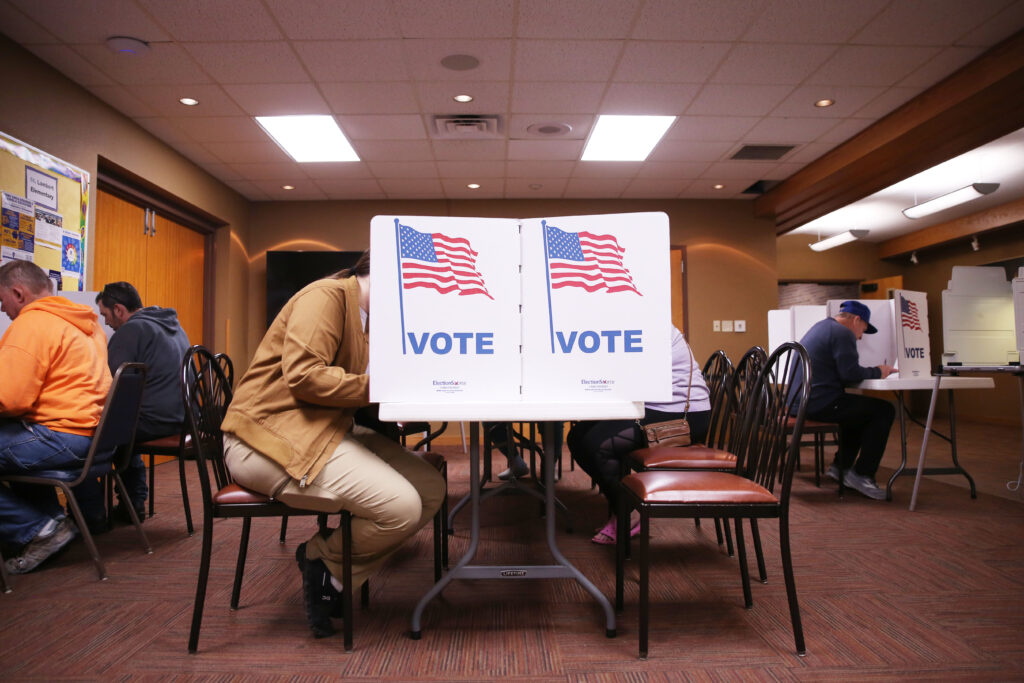Sioux Falls residents vote in the general election on Nov. 5, 2024, at St. Lambert’s Catholic Church. (Makenzie Huber/South Dakota Searchlight)
Legislators finalized rules this week allowing additional grounds for challenging a person’s right to vote in South Dakota.
The rules, approved Tuesday by the Interim Rules Review Committee, are a result of Senate Bill 185, which was signed into law in March. It expanded the justifications for challenging voter rights to include claims that a registered voter has died, is not a legal resident of the state or has voted or registered in another state.
Previously, state law allowed challenges based on a person’s identity, a felony conviction or mental incompetency. Those challenges are still allowed.
The new rules were part of a larger package presented by the Secretary of State’s Office and the Board of Elections to align with several “election integrity” bills approved by lawmakers earlier this year. Activists who favor the hand-counting of ballots, oppose the use of vote-counting machines and deny the legitimacy of the 2020 presidential election were among those who supported the legislation.
Rules not ‘perfect,’ voting official says
Deputy Secretary of State Tom Deadrick told committee members it was “challenging” to “keep the due process in line” for people who are being challenged.
“I’m not going to tell you it’s a perfect package, because I doubt if it’s perfect,” Deadrick said, “but I think it’s a pretty good package that takes care of the legislative intent.”
State Sen. Amber Hulse, R-Hot Springs, sponsored the legislation. She told South Dakota Searchlight that the rules are largely aligned with her bill’s intentions, but she’s concerned that requiring challengers to provide personal information for voters in question could lead to privacy risks for South Dakotans.
There are people on South Dakota’s voter registration list who should not be registered to vote in the state, Hulse said. But the challenge process should be a balance.
“You have to ensure that you’re protecting people’s private information and protecting their right to vote, due process rights and other really big rights that go into these processes,” Hulse said. “It makes it feel clunky or difficult, but that’s purposeful so we’re protecting arguably more important rights than cleaning voter rolls.”
The American Civil Liberties Union-South Dakota’s Samantha Chapman originally opposed the legislation, but worked with Hulse in an attempt to make it less onerous to voters. Chapman said the rules create “stronger protections against indiscriminate challenges” because the documentation “should be hard to track down,” but she said they could be stronger for voters.
“We are putting potentially an undue burden on voters to hang on to their ability to vote,” Chapman said.
Chapman’s greatest concern is about challenges based on voting histories in other states. Sometimes a person’s voter registration in their former state isn’t canceled due to administrative oversight or miscommunication between states.
“It assumes the voter intends to vote twice when in reality it could be an administrative error outside of their control,” Chapman said.
How challenges work
Based on the new rules, challengers must be registered to vote in the same county as the person they’re challenging on residency or out-of-state registration grounds, and must submit the challenge at least 90 days before an election. Challenges based on a person dying ahead of an election, being mentally incompetent or being imprisoned must be submitted by a South Dakota registered voter at least 30 days before an election.
A challenge to a voter’s residency must include evidence that the voter is not a South Dakota resident, based on state election law. The challenger must provide, under a sworn oath in front of a notary, one of the following:
- A driver’s license or ID card issued by another state.
- A resident hunting, fishing or trapping license issued by another state.
- A postal change of address indicating the voter moved to another state.
- State or county property records indicating ownership of a primary residence in another state.
- Tax documents indicating the voter is a resident of another state.
- A residency affidavit or certificate from another state.
Election 2026 news delivered to you: Sign up for our free newsletter.
A challenge to a voter’s out-of-state registration or voting history must include a voter file from an election official in that state documenting the claim. There is not a time parameter set for voting history evidence.
The challenged voter must fill out a “verification request” mailed to them by their county auditor within 30 days of the challenge, with evidence documenting their qualifications as a registered voter.
Challenged voters can request a hearing and appeal decisions to the board of county commissioners or circuit court, but there is no appeals process for the challenger spelled out in the rules.
The county auditor must cancel the voter’s registration if the voter doesn’t respond with sufficient evidence. But the removal can’t happen within 90 days prior to an election, and only challenged voters who don’t cast a vote in the time between the challenge and the next general election can be removed. Auditors will notify the challenger and challenged voter of their decision.
If someone votes who is later determined to be ineligible, that can be challenged through the courts rather than the new challenge process, according to Hulse. She said the new process is designed to remove registered voters who are both ineligible and inactive.
“This process is more for folks who claim residency but aren’t participating in elections,” Hulse said, adding that such people can influence election district boundaries when they’re counted as registered voters.
All of the committee members present approved the rules for voter registration challenges.


